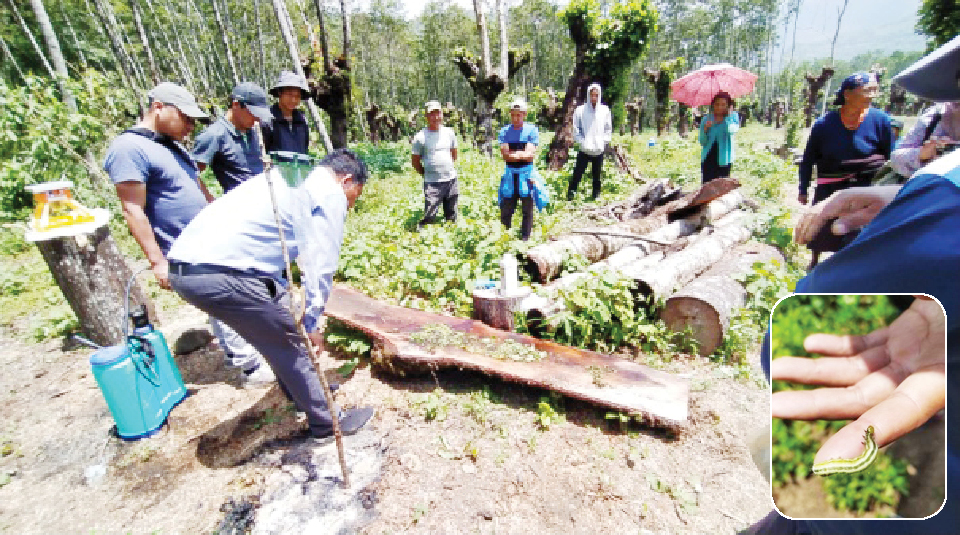Khonoma farm pests identified

Officials from the Department of Agriculture visited the affected farms in Khonoma on May 18. (Inset) The worm was identified as a semi-looper leaf eating caterpillar of a moth belonging to the family Noctuidae. (Morung Photo)
Atono Tsükrü Kense
Kohima | May 19
The worm which has infested the potato farms at Khonoma village has been identified as a type of semi-looper leaf eating caterpillar of a moth belonging to the family Noctuidae. The worms are polyphagous (able to feed on various kinds of food) pests infesting maize, cabbages, carrots and beans.
Following reports that Khonoma’s organic potato farms were being invaded by worms, officials from the Department of Agriculture went for field visit on May 18 to assess the pest infestation. With no options due to the massive infestation, the farmers were manually picking the larvae as control measure.
Speaking to The Morung Express, DDAO, Kekhrieletuo Yhome said, though many have speculated it to be fall army worm, the pest has been identified as a type of semi-looper leaf eating caterpillar.
“The larvae are plump and pale green with white longitudinal stripes having three pairs of true legs in front and three pairs of pro-legs behind. Moths lay eggs on leaves and the larvae feeds individually biting holes of varying size depending on the stages of development. They pupate in the leaves of potato plant as well as in maize plant” informed Yhome.
Semi-loopers, he stated are defoliaters (adult or larval insect which strips all the leaves from a tree or shrub) causing significant losses during vegetative and reproductive stages thereby severely affecting yield. The infestation was very high in some of the fields that it caused complete defoliation of potato leaves and moved on to maize plants, cabbages, beans and carrots.
Upon thorough inspection of the fields, he said, around 25-30 Ha of potato fields have been infested and destroyed by the semi-looper.
With the area of infestation being very vast, Yhome said that manual sprayers would not suffice. “There is a massive pest infestation, and it’s going to be a hard and herculean task both for the department as well as the farmers to control the pest population” he said, while adding that bio-pesticides have been ordered and are expected to reach Kohima tomorrow.
“We are working to take some motorised power sprayers and teach the farmers on how to use the sprayer, so that they can cover up the whole area within 2-3 three days time” said Yhome.
One being enquired on the infestation at Khuzama village, he said some personnel will deputed to Khuzama village to assess the infestation of crops on May 20. He however, said the infestation is not that heavy as in Khonoma.
During their field visit, demonstration on how to prepare different bio-pesticides, use of pheromone traps, light traps for management of the pest was done in the field while knapsack sprayer, neem oil, seeds (French bean, maize), light traps, pheromone traps were distributed among the farmers.
Yhome assured that the department of agriculture will continue to monitor the pest infestation and constantly inspect the potato fields in the following weeks to see the effectiveness of the treatment and then will see the way forward as to what action should be mitigated.
Meanwhile, the DIPR informed that approximately 700- 800 ha of farm land has been affected by a semilooper, commonly known as the inch worm. The worms are reported to be feeding on potato, chilli and bean plants.
It also stated that this year, about 2961.95 ha of Kharif maize has been infested by the fall army worm. Input support from the Agriculture Department has been dispatched to the affected areas and human resource support from ATMA, KVKs, CIPMC and extension personnel of the Department are involved in the surveillance, monitoring and control operations, the report stated.






